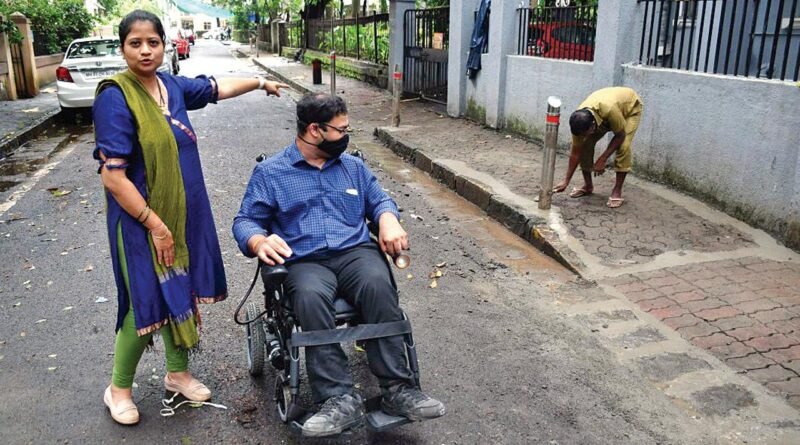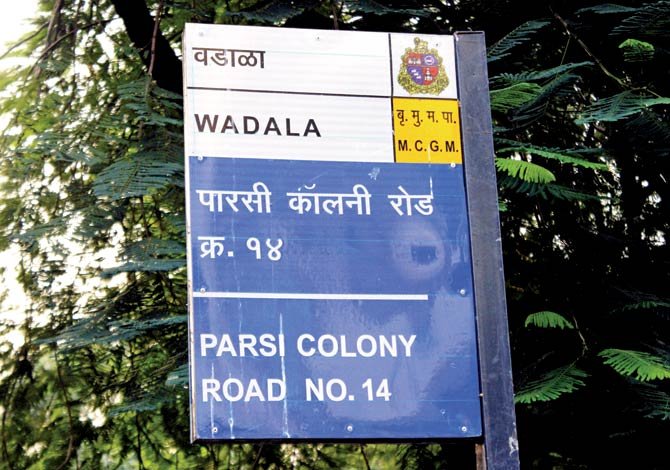Resident on mission to make Dadar Parsi Colony wheelchair friendly
Physically challenged wheelchair using resident spearheads campaign after finding it very difficult to access facilities near his residence

When India won 19 medals in the recent Paralympics in Tokyo, there was exultation at the country’s best-ever performance at a Paralympics. Even as we applauded the physically-challenged athletes, we need to use the momentum of this achievement to push for greater accessibility in every aspect of life for the differently-abled.
The lead Siddharth Mhatre, a resident of Dadar Parsi Colony (DPC), is spearheading an initiative to make his immediate environment, the salubrious colony more accessible to those using wheelchairs and crutches. Mhatre has been afflicted by cerebral palsy since birth and uses a wheelchair.
“I was a crutches user earlier, but my radial nerve (in the arm) was getting compressed. I switched to the wheelchair then, and in both instances, witnessed how difficult it was to access facilities near my home, like a park just to give an example. Our colony has many parks within.” Mhatre approached the Colony corporator Amey Ghole, and the ball, or should that read wheelchair? started rolling. Mhatre, 33, said, “The BMC was extremely responsive. The footpath, one just outside my building in fact, has been made with a slope so that the wheelchair can get on to it. I am fortunate, I have a robust support system, but not everybody has that kind of help. When we are abroad, we see public infra with parking spaces for the physically-challenged and wheelchair persons have access everywhere, that is the level of awareness we have to bring here.” Mhatre works in the facility management department of a real-estate company.
Way ahead
Ghole, the corporator stated, “I see this as a huge factor in bringing independence to persons with disabilities. With independence, comes pride, dignity and a certain agency, that these individuals may not have otherwise. This late spell September rain has proven to be a slight hiccup in the work, but we shall prevail.” Four foothpaths have been done in DPC.
The Big M may stand for McDonalds for most, but for the challenged, it is mobility. Said Dr Unnati Shelar, neurophysiotherapist – Mhatre is her patient, “I have treated so many able persons as well. They have suffered significant injuries falling on our footpaths or roads. Having even surfaces is vital. We need to start small and move ahead. There is also a case for making public transport more accessible. Like the buses for instance, where the first step is high, the disabled find it difficult to board these. We have ATM kiosks that the challenged cannot access. They have to hand over their card to somebody they trust implicitly to withdraw money for them. Everybody may not have that option. We have to open up the world to them.”
Greater benefits
One of the happy spin offs of this project, is, like Dr Shelar has said, that inclusivity measures are advantageous to other sections too. Dr Manisha Talim, diabetologist and DPC resident had a doff of the hat for the BMC and Mhatre for this pioneering project. She reminded, “We have so many senior citizens in the colony. This is going to help them as well as the differently-abled.” Those with team Mhatre said the BMC engineers accompanied them to different spots within the colony for an on-the-ground understanding and assessment, before work began.
The Mumbai non-governmental organization (NGO) Access to Hope, inspired Mhatre and Dr Shelar to start the initiative. Said founders Sanket Khadilkar and Jasmina Khanna, “We have done a project in Vile Parle (E). We are working in an advisory capacity with Mhatre. We are enthused by the fact that several contractors told us that these measures are doable. It is the people’s mindset though, that needs awakening. First comes sensitization, then awareness and that leads to action.” Khadilkar-Khanna added as a punchy postscript aligning with the axiom that accessibility is for all: “A pedestrian friendly footpath may not always equal to disabled-friendly, but a disabled friendly footpath is by nature, pedestrian friendly, that means for all.”
Source: Click here





